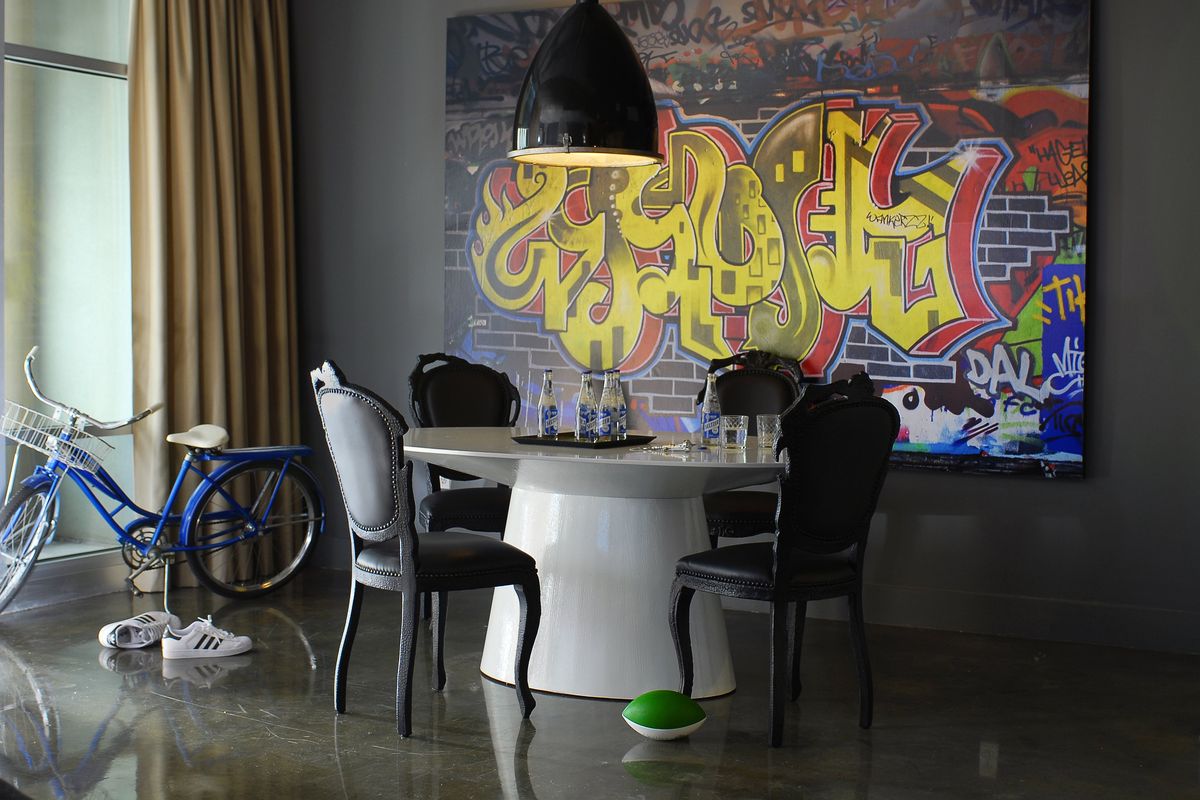Fashionable flooring
From hardwoods to area rugs to concrete, add glamour to your home from the ground up

Acid-stained concrete. Vintage hardwood, painted ultra-white or shimmering black. High-tech, eco-friendly laminates in a wild array of textures and colors. The options for fashionable flooring are endless these days, and even the most cutting-edge styles don’t have to break your budget. In many homes, floors are the design element most likely to be ignored. But they can be the perfect place to add glamour. Designers Brian Patrick Flynn, Janine Carendi and Mallory Mathison comment on what’s new, what’s hot and what’s timeless in flooring:
Faking it
Love the look of wood floors but can’t pay for something that involves days of installation, sanding and finishing? Flynn recommends pre-finished laminate floors that mimic the look of exotic hardwoods.
“These are tongue and groove ‘quick click’ systems that only require a table saw to cut end pieces to size,” he says.
Panels can be installed quickly because they rest over the existing floor (“floating” is the industry term) and don’t have to be nailed down.
“You can do an entire kitchen in three hours,” says Flynn. “The directions are super-easy to follow. You simply put down foam underlay over your existing floor, as long as it is level, and then lay down each piece and stagger the lines.”
He says the newest laminates are quite stylish: “My favorite one right now is a gray-toned line from Armstrong that has a high-gloss finish.”
The cost is considerably lower than real wood. Flynn’s favorite styles cost about $3.69 per square foot.
The downside: You’re stuck with the style you’ve chosen. Because laminate isn’t real wood, laminate floors can’t be stripped and re-stained a different shade a decade from now.
Carendi also points out that some laminates don’t wear well in the long term.
Classic hardwood
If you have the money and time, installing hardwood is the best choice, the designers say. Installation and re-staining can be expensive and messy, but the results are worth it.
“You can’t replace the warmth and texture a wood floor gives you,” Carendi says. Many homeowners are using hardwoods throughout the house, even in kitchens and bathrooms.
In homes with scuffed or faded hardwood, Mathison suggests painting it. Re-staining a damaged hardwood floor can draw attention to imperfections, but painting often brings out the charm of aged wood.
Flynn agrees: “If you have tons of dings and divots, paint makes the imperfections look cool. And paint makes the lines of the wood more pronounced and kind of creates a nice, linear architecture in the floor.”
Painting a wood floor is easy, Mathison says, and a great way to add a burst of color or create a dramatic effect.
“A high-gloss black looks amazing,” she says, “or you could create patterns just with painters tape or stencils.”
One variation on traditional hardwood: hardwood veneers, made from a thin layer of real hardwood attached to boards made of engineered wood or pressboard. They’re less expensive and can be easier to install than real hardwood, but quality varies widely.
Carpets, rugs and tile
Area rugs are popular in many shapes and textures, and Carendi says even indoor/outdoor rugs can be surprisingly attractive.
“If you have kids or dogs or a high-traffic area, you can clean them easily,” she says. “You can even hose them down outside.”
Flynn is a fan of Flor tiles, modular squares with a carpet-like texture that are simple to install.
“You can configure your own design on the Web site and then it arrives a few days later in what appears to be a super-size pizza box,” he says.
“The best thing overall is the durability factor. If you happen to spill red wine on one of the tiles, you simply replace the one tile rather than having to completely replace the entire room or area. You can even take the tiles to the sink and rinse them with water and find that most accidents will disappear.”
Renters can take Flor tiles along when they move. And homeowners can move them from one room to another with little effort.
Two things these designers are seeing less of: wall-to-wall carpeting and porcelain tile.
“You see porcelain tile mainly in laundry rooms,” Mathison says, “but not much elsewhere.”
Concrete
One of the things that makes urban loft apartments fashionable, Flynn says, is concrete floors. They can be casual or high-style, and are nearly indestructible.
“I refer to concrete as the ideal floor for the commitment-phobic because the possibilities for customizing it are endless,” he says. “Matte concrete can be absolutely beautiful and really allows treasured pieces to shine, since there is no sheen on the ground competing with sheen on furniture or accessories.
“Lately, my favorite finish for concrete floors is a high-gloss clear coat. This gives the concrete a wet look that really helps reflect light around the space.”
One trend all three designers have noticed: “You see fully recycled ‘green’ flooring now,” Mathison says. “Every single major company is moving toward having a huge portion of their products be green-friendly.”
Whatever the flooring, many homeowners in today’s economy must consider whether their choice will appeal to potential buyers if they decide to sell their home. Bold style choices work best if they can be easily changed.
Carendi recently saw a beautiful New York apartment with a surprisingly low asking price. The reason it was lingering on the market? The owner had installed rubber floors.
Visitors thought the flooring was striking, but prospective buyers didn’t want to live with it or invest the money to remove it.